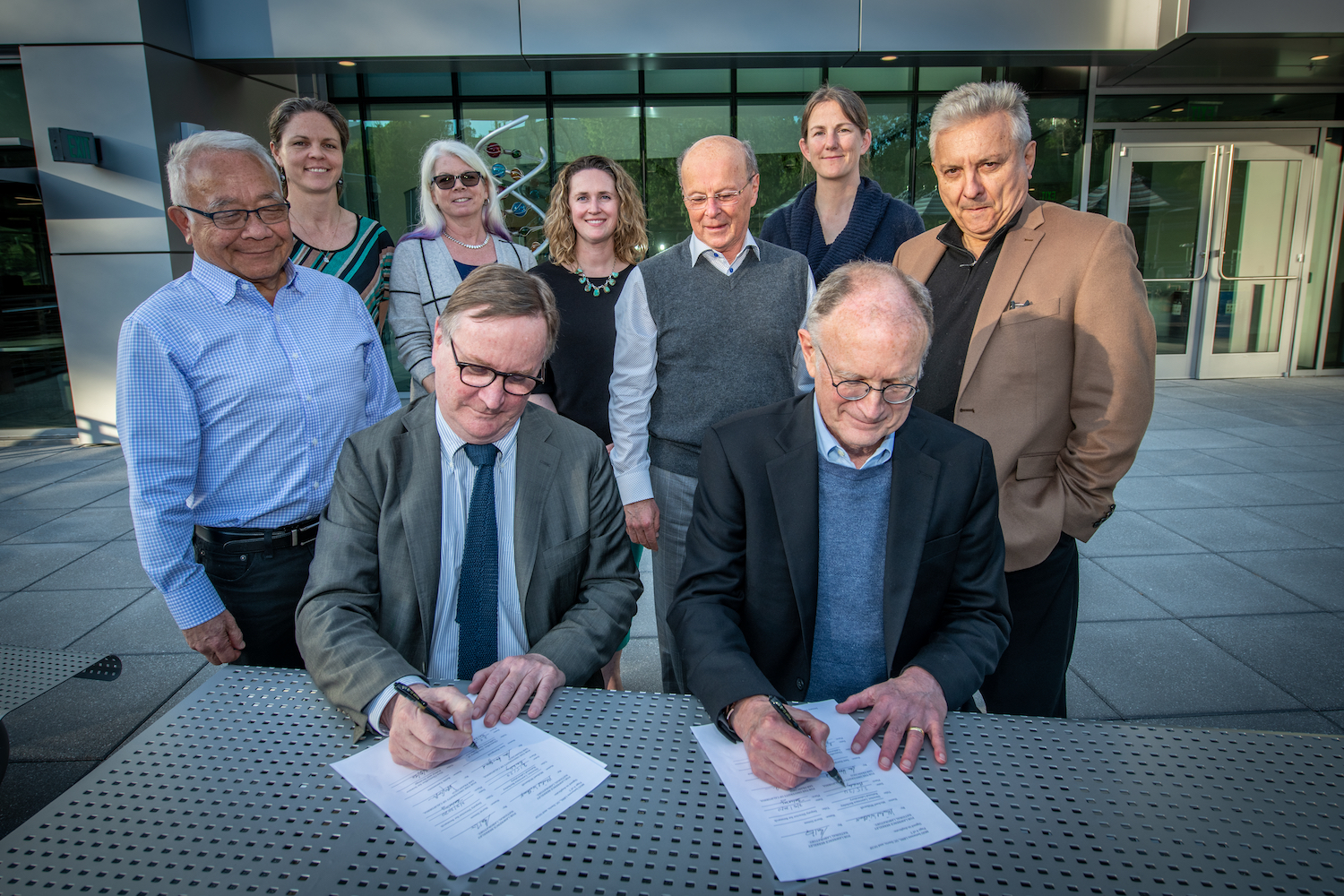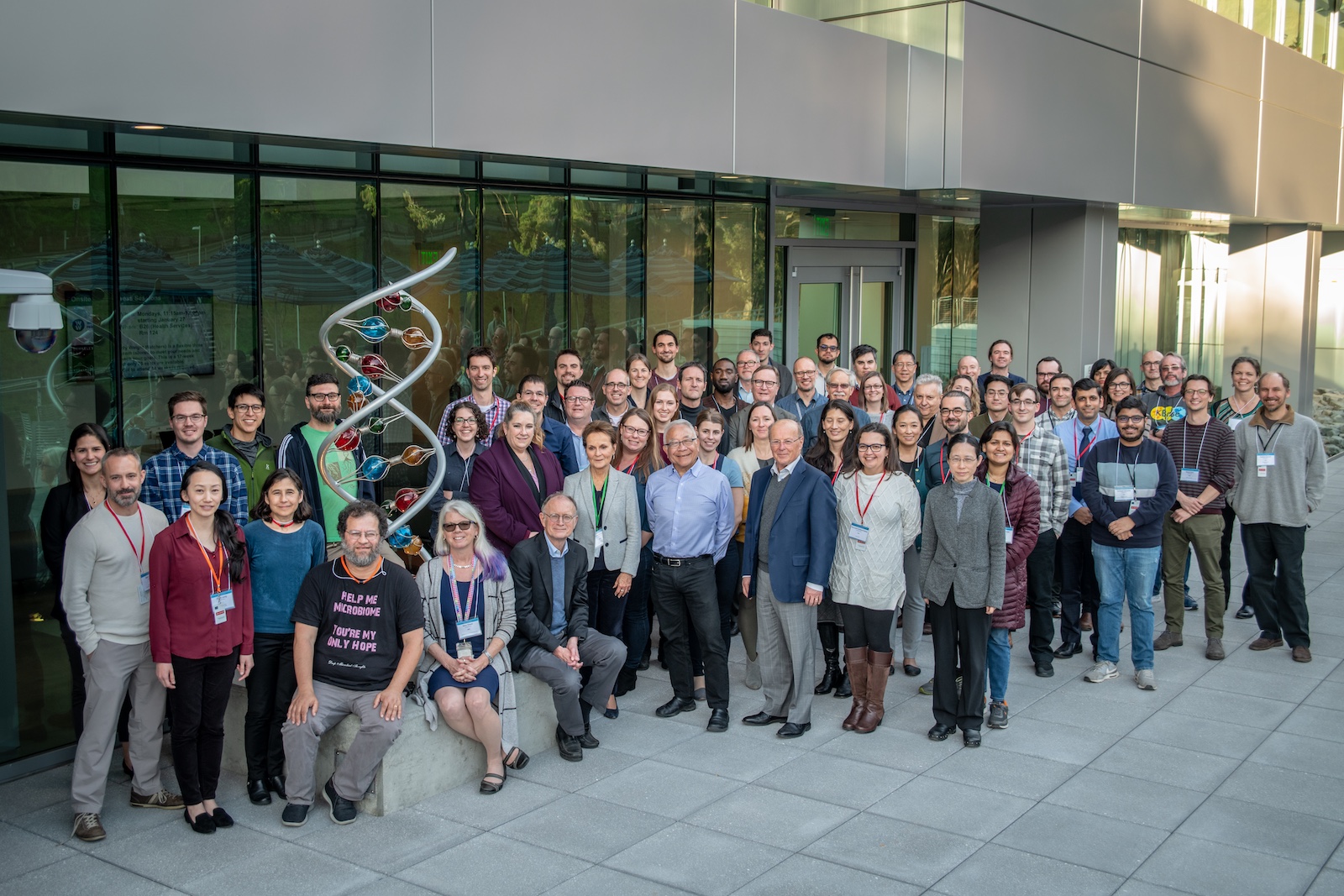
At the February workshop organized by the National Microbiome Data Collaborative, the MOU creating the Tri-institutional Partnership for Microbiome Research was formally signed. From L to R in foreground: Keith Yamamoto and Sam Hawgood
(UCSF); Fred Myers (Director of the Center for Precision Medicine and Data Sciences, UC Davis); Mike Witherell and Horst Simon (Berkeley Lab). In the back row (L to R): Elisha Wood-Charlson (NMDC Engagement Lead), Mary Maxon (Berkeley Lab), Emiley Eloe-Fadrosh, NMDC Lead, and Kjiersten Fagnan (NMDC Infrastructure Lead). (Credit: Thor Swift/Berkeley Lab)
Microbiomes are integral to all life, from human health and food security to ecosystem processes and global nutrient cycling. Collaborative research – performed by scientists spanning the vast biological and bioinformatics fields – is key to developing a predictive understanding of microbiome function and could lead to advancements in areas such as biomanufacturing, food production, combating antimicrobial resistance, and biosafety
University of California San Francisco (UCSF), UC Davis, and Lawrence Berkeley National Laboratory (Berkeley Lab) have formed a Tri-Institutional Partnership in Microbiome Research (TrIP Microbiome) to leverage their collective expertise in these areas. Together, the TrIP Microbiome institutions will catalyze and fund novel, bold, and potentially transformative collaborative microbiome research projects proposed by their scientists.
A unique aspect of the partnership is its data-driven focus and data infrastructure, brought through the participation of the Berkeley Lab-led National Microbiome Data Collaborative (NMDC, microbiomedata.org). The NMDC, which is funded by the Department of Energy Office of Science, was launched in 2019 to support the long-term advancement of microbiome science by building an open and integrated data system. The NMDC is working with TrIP Microbiome researchers to catalyze experimental co-design between biologists and computational scientists, adoption of data management best practices, and open science to promote cross-study comparison and machine learning.
“This program is exciting because it brings together data scientists and biological researchers from the start, allowing them to jointly design and execute experiments,” said Horst Simon, Berkeley Lab Deputy Director for Research. “This partnership is a follow up to a previous tri-institutional collaboration about neuroscience. I am excited that we can continue to strengthen our ties with UCSF and UC Davis in the important fields of microbiology and data science.”

Attendees at the TrIP Microbiome Workshop at Berkeley Lab’s Integrated Genomics Building. (Credit: Thor Swift/Berkeley Lab)
In February, Berkeley Lab hosted 85 researchers from UCSF, UC Davis, and Berkeley Lab for a Proposers’ Day workshop, where a jointly funded $1 million proposal opportunity was announced with the formal signing of a Memorandum of Understanding (MOU) by institutional leaders. “This MOU signifies our collective commitment to unlocking groundbreaking advancements in microbiome research that hold tremendous promise for human health and safety,” said Prasant Mohapatra, vice chancellor for research at UC Davis. In addition to Mohapatra, the MOU was signed by Berkeley Lab Director Mike Witherell, Simon, UCSF Chancellor Sam Hawgood, and UCSF Vice Chancellor for Science Policy and Strategy Keith Yamamoto.
“This is a cross-institutional collaboration with a truly transdisciplinary mindset,” said Yamamoto. “Microbiomes, not just in humans, but in plants and animals across our environment, are fundamental to human health. Investigating them in this synergistic manner will produce major new insights. The overarching concept here is precision medicine, which integrates data science with clinical and basic research, to fast-track discovery.”
Following the workshop, 15 proposals were submitted for consideration and reviewed by researchers from the TrIP Microbiome institutions.
The TrIP Microbiome leadership and organizing committee, which included Simon, Berkeley Lab Associate Laboratory Director for Biosciences Mary Maxon, Mohapatra, and Yamamoto, met in May to make final proposal selections and awarded funding to five teams:
- Colonization resistance against Candida, Andreas Baumler* (UC Davis), Suzanne Noble (UCSF), Krystle Reagan (UC Davis), Hannah Savage (UC Davis), Andrew Tritt (Berkeley Lab)
- FODMAP utilization by the microbiota, Andreas Baumler* (UC Davis), Emiley Eloe-Fadrosh (Berkeley Lab), Peter Turnbaugh (UCSF)
- MicroMetabolome: a biological and analytical framework of the human microbiome-metabolome axis, James Bentley Brown (Berkeley Lab), Oliver Fiehn (UC Davis), Matthew Spitzer* (UCSF)
- Precision editing of gut dysbiosis in inflammatory bowel disease for ameliorating inflammation, Adam Arkin (Berkeley Lab), Maneesh Dave* (UC Davis)
- Unraveling strain-level virus-host dynamics in diverse ecosystems, Titus Brown (UC Davis), Joanne Emerson* (UC Davis), Peter Turnbaugh (UCSF), Simon Roux (Berkeley Lab)
*Contact Principal Investigators for the proposal team
The interdisciplinary projects are expected to start this summer. “We were thrilled to have such a deep field of proposals from diverse teams of researchers to consider for the awards,” said Maxon. She added that the success of this effort could help pave the way for NMDC to partner with other federal agencies, such as the National Institutes of Health and the US Department of Agriculture. “Both of these agencies collaborated with the DOE on a federal microbiome strategic plan designed to maximize the use of microbiome data,” she explained.
The current focus, Maxon says, are these new projects. “We hope that TrIP Microbiome sparks interesting and productive relationships between researchers and the NMDC, as well as catalyzes future relationships between UCSF, UC Davis, and Berkeley Lab scientists.”
# # #
Founded in 1931 on the belief that the biggest scientific challenges are best addressed by teams, Lawrence Berkeley National Laboratory and its scientists have been recognized with 13 Nobel Prizes. Today, Berkeley Lab researchers develop sustainable energy and environmental solutions, create useful new materials, advance the frontiers of computing, and probe the mysteries of life, matter, and the universe. Scientists from around the world rely on the Lab’s facilities for their own discovery science. Berkeley Lab is a multiprogram national laboratory, managed by the University of California for the U.S. Department of Energy’s Office of Science.
DOE’s Office of Science is the single largest supporter of basic research in the physical sciences in the United States, and is working to address some of the most pressing challenges of our time. For more information, please visit energy.gov/science.